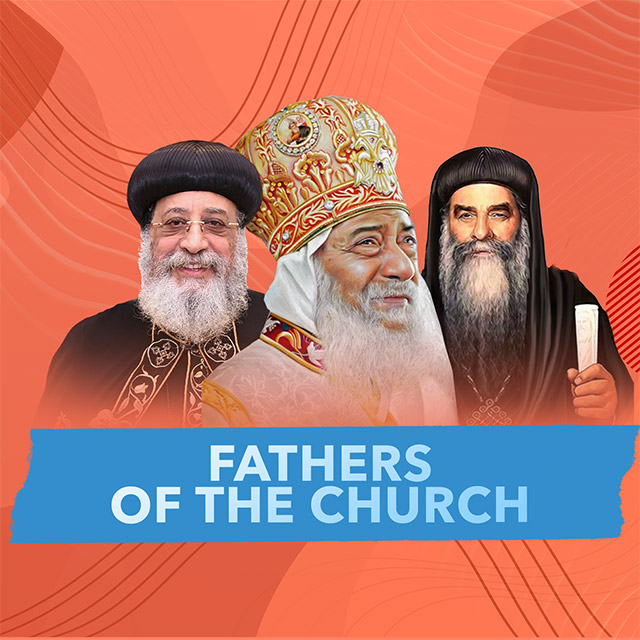By St. Athanasius the Apostolic + The blessed Paul wrote to the Corinthians, saying that he always carried in his body the death of Jesus (2 Corinthians 4:10). This is not a matter of pride for him alone; it is required of them and us as well. My brothers, let us follow in Paul’s footsteps and let this be our pride… let us follow in Paul’s footsteps and let this be our pride… let us follow in Paul’s footsteps and let this be our pride… let us follow in Paul’s footsteps and let this be our constant pride in everything: to bear the death of our Lord Jesus. David shares in this sentiment in the Psalms, saying, “For your sake, we face death all day long; we are considered as sheep to be slaughtered” (Psalm 44:22). Let this be in us, especially during the days of the feast when we remember the death of our Savior, for those who become like Him in His death also strive in virtuous deeds, mortifying their earthly members (Colossians 3:5), crucifying the body with its passions and desires, living in the Spirit, and walking according to the Spirit (Galatians 5:24-25). Such a person constantly thinks of God, never forgetting Him, nor committing deeds of death. Now, to bear in our bodies the death of Jesus, the apostle shows the path to follow, saying, “We have the same spirit of faith, according to what is written: ‘I believed; therefore I have spoken.’ We also believe, and therefore speak” (2 Corinthians 4:13). He also speaks of the grace that comes from knowledge, saying, “knowing that He who raised the Lord Jesus will also raise us with Jesus and present us with you” (2 Corinthians 4:14). + Through faith and knowledge, the saints embraced this true life, receiving heavenly joy, which the wicked do not attain as they are deprived of the blessedness it brings. They do not see the majesty of the Lord (Isaiah 26:10). Even when they hear the general proclamation, “Awake, O sleeper, and rise from the dead” (Ephesians 5:14), they rise and come to heaven, knocking on the door, saying, “Lord, open to us” (Matthew 25:11). But the Lord will rebuke them, saying, “I do not know you.” + We say that the wicked are dead, but not in a life devoted to opposing sin, nor like the saints who bear death in their bodies. Instead, they bury the soul in sins and follies, drawing near to death by indulging it in deadly pleasures. + The saints, who practice virtue truly, mortify their earthly members—sexual immorality, impurity, passion, evil desire (Colossians 3:5)—resulting in purity and unblemished living. Thus, the promise of our Savior is fulfilled in them: “Blessed are the pure in heart, for they shall see God” (Matthew 5:8). + These saints have become dead to the world, disregarding its possessions, gaining an honorable death because “Precious in the sight of the Lord is the death of His saints” (Psalm 116:15). + These also can say with the apostle, “I have been crucified with Christ; it is no longer I who live, but Christ lives in me” (Galatians 2:20). + This is the true life that a person lives in Christ. Though they are dead to the world, they live as if in heaven, occupied with heavenly things, desiring to dwell there, saying: “For our citizenship is in heaven” (Philippians 3:20). + Those who live this way, participating in such virtue, are alone able to glorify God. This is the true meaning of the feast (resurrection), for the feast is not about indulging in meats and luxurious clothes, nor is it days of indulgence. Its joy lies in knowing God and offering thanks and praise to Him. + This thanks and praise is given by the saints who live in Christ, for it is written: “The dead do not praise the Lord, nor do any who go down into silence. But we will bless the Lord from this time forth and forevermore” (Psalm 115:17-18). + Praising and glorifying God belongs to the saints who live in Christ alone, and by this, they ascend to the feast. The Passover is not for the Gentiles nor for the Jews according to the flesh but for those who know the truth, as the one sent to proclaim such a feast declares, “For Christ, our Passover, was sacrificed for us” (1 Corinthians 5:7). + The righteous person, though appearing dead to the world, dares to say, “I shall not die, but live, and declare the works of the Lord” (Psalm 118:17). + Even God is not ashamed to be called their God, for they truly mortify their earthly members (Colossians 3:5), living in Christ, for He is the God of the living, not of the dead. By His life-giving word, He revives all people and gives Himself as food for the saints to live, as the Lord declared, “I am the bread of life” (John 6:48). + Sin also has its own bread, leading to death, inviting pleasure-seekers and the foolish to eat, saying, “Stolen water is sweet, and bread eaten in secret is pleasant” (Proverbs 9:17). + My brothers, since things are this way, let us mortify our earthly members (Colossians 3:5) and feed on the living bread through faith in God and love for God, knowing that without faith, we cannot partake of such bread. For when our Lord called all to Him, He said, “If anyone thirsts, let him come to Me and drink” (John 7:37). + The righteous person nourishes himself in faith, knowledge, and observing God’s commandments, thus his soul is always in good health.
Related Knowledge Base Posts
- Why do demons ake control of some people? (4 minutesread)
- How did we receive the Holy Scriptures?, what is the composition of the bible? (1 minuteread)
- How the Old Testament Books Came to Us: (1 minuteread)
- What is the truth behind the Guardian Angel in the Orthodox Church? (2 minutesread)
- What are the main features about the Coptic Calendar of Martyrs? (2 minutesread)
- What is the Church’s ruling on a person who leaves their faith and then returns?* (1 minuteread)
- What are the signs of the second coming? (5 minutesread)
- How did Saint Augustin describe his mother? (1 minuteread)
- What are the various names of God in the Bible? (3 minutesread)
- What are the Seven Sorrows in the Life of the Holy Virgin Mary? (1 minuteread)
- Glory to God, so why do we glorify the Virgin Mary? (2 minutesread)
- Can you give us a brief history of Egypt through the Ages? (3 minutesread)
- What is the meaning of Lighting Candles in the Church? (3 minutesread)
- What happened to those who attacked the Holy Bible, and what happened to their ideas? (2 minutesread)
- What is the Feast of the Transfiguration? (3 minutesread)
- Why were Moses and Elijah with Christ on the Mount of Transfiguration? (2 minutesread)
- Can you explain the creatures mentioned in Chapter 13 of the Book of Revelation? (4 minutesread)
- Is there a conflict between God and Money? (6 minutesread)
- What is the Christianity’s view on Magic? (2 minutesread)
- Why would God allow Satan to tempt him? (2 minutesread)














